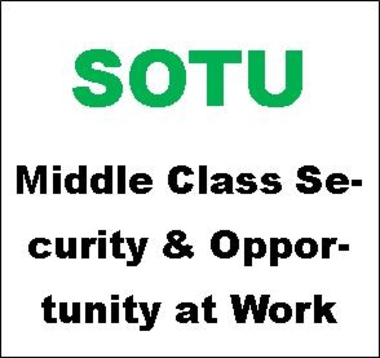SOTU: Middle class security & opportunity at work

Making progress through executive action
Raising the minimum wage to $10.10 for those working on new federal contracts. A higher minimum wage can raise earnings and reduce poverty. More businesses, from small businesses to large corporations like Costco, see higher wages as the right way to boost productivity, reduce turnover and increase profits. The President will issue an Executive Order to raise the minimum wage to $10.10 for the individuals working on new federal service contracts.
Creating “myRA” – a safe, easy-to-use starter savings account to help millions of middle class Americans save for retirement. Starting to save is just the first step towards a secure retirement. Workers must have a place to invest their hard-earned savings that provides an appropriate balance of risk and return, and many private sector providers do not offer retirement savings options tailored to smaller balance savers. Our retirement system should help these potential savers and encourage them to begin building their retirement security. The President is using his executive authority to create “myRA” (my Retirement Account) – a new simple, safe and affordable “starter” retirement savings account that will be available through employers and help millions of Americans save for retirement. This savings account would be offered through a familiar Roth IRA Account and, like savings bonds, would be backed by the U.S. government.
Building a 21st century workplace for America’s working families. In spring of 2014, the White House, the Department of Labor (DOL) and the Center for American Progress (CAP), will host a Summit on Working Families to set an agenda for a 21st century workplace to ensure America’s global economic competitiveness in the coming decades. The Summit will make the business and economic cases for policies that support working families; showcase companies doing exemplary work in this space; and highlight model laws and policies from cities and states across the country in areas such as discrimination, flexibility, and paid leave.
Continuing to work with Congress
Extending emergency unemployment insurance for Americans looking for work. At a time when we as a nation should be moving forward in our efforts to help those who are long-term unemployed find new jobs, we should never have taken a step backwards by abruptly cutting off their unemployment insurance. The President urges members of both parties to come together right now to at a minimum pass a bipartisan three-month extension under consideration in the Senate. By temporarily extending emergency unemployment insurance for three months, this bipartisan bill will provide benefits for over 2 million Americans when they need it most, including the 1.6 million Americans who have already lost access to these benefits since the program expired at the end of last year.
Raising the minimum wage to $10.10. The President will continue to call on Congress to pass the Harkin-Miller plan to raise the Federal minimum wage for working Americans in stages to $10.10 and index it to inflation thereafter, while also raising the minimum wage for tipped workers for the first time in over 20 years. The President knows this is important for workers and good for business.
Rewarding hard work by expanding the Earned Income Tax Credit (EITC). President Obama’s Child Tax Credit and Earned Income Tax Credit expansions benefit 15 million families each year, providing an average tax cut of about $800. The President is now calling on Congress to pass a significant increase in the EITC for workers without children, including non-custodial parents. Currently, workers without children qualify for a maximum credit of about $500, which phases out at very low incomes. The President is proposing to encourage work and reduce poverty by raising the maximum credit and making the EITC available to more low-wage workers to provide a more meaningful work incentive.
Removing retirement tax breaks for the wealthiest while improving them for the middle class. About half of all American workers do not have access to workplace retirement savings plan. Furthermore, our tax incentives mostly benefit high-income individuals already well-positioned for retirement, allowing them to reap tens of thousands of dollars more in tax breaks than middle-class families. The President’s budget will propose to establish automatic enrollment in IRAs (or “auto-IRAs”) for employees without access to a workplace savings plan, in keeping with a plan that he has proposed in every budget since he took office. And, the President wants to work with Congress to make sure that when we take steps to reform our tax code that we also reform upside-down retirement tax incentives.
Supporting workplace fairness for women. The President reiterated his call for Congress to pass the Paycheck Fairness Act that would strengthen the Equal Pay Act and give women more tools to fight pay discrimination. The Administration will also continue to work to ensure that having a baby does not jeopardize a woman’s job, and that more hard working Americans can have access to paid leave in order to take care of family members and themselves. Because the President knows that when women succeed, America succeeds.
Workplace equality for LGBT workers. Today, federal law prohibits employment discrimination based on race, sex, religion, and disability. It’s time to add sexual orientation and gender identity to that list, so that no American worker can lose his or her job simply because of who they are or who they love. The Employment Non-Discrimination Act would provide strong federal protections for lesbian, gay, bisexual, and transgender workers. Last year, a bipartisan majority of the Senate passed ENDA, and the President renews his call for the House to do the same.





